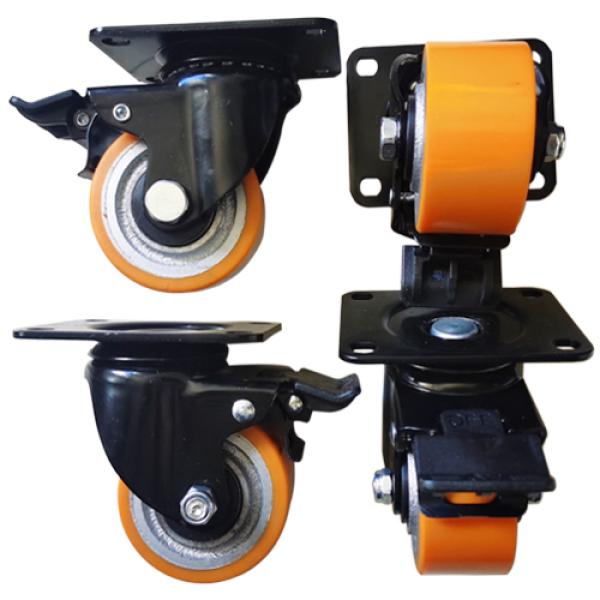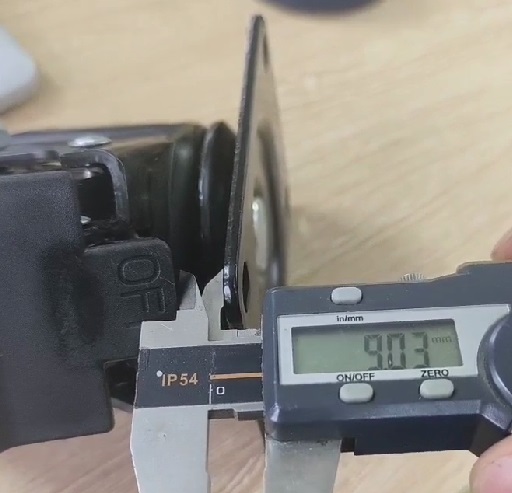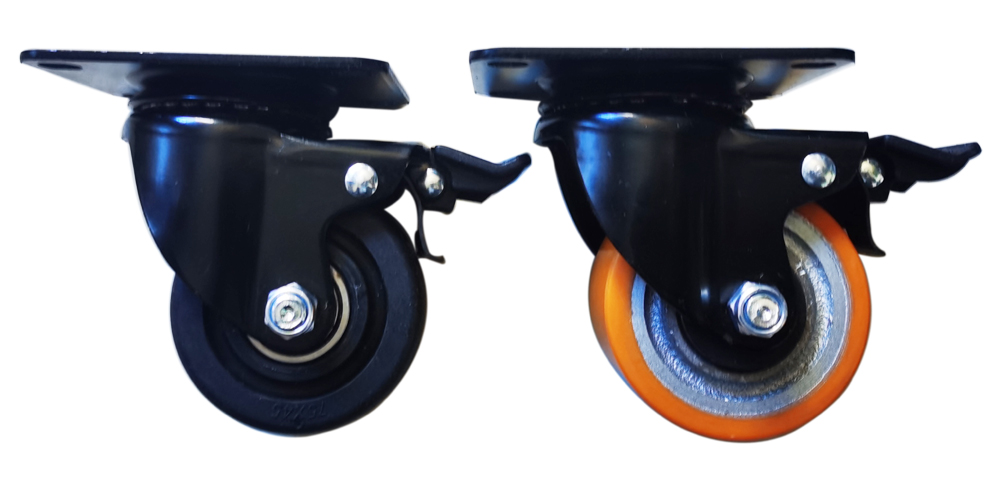Pu Caster Wheel

Description:
Low profile cast iron pu castersMaterial: Cast Iron core + PU tread
Size :75mm x 40mm
Mounting: Plate
Advantage: Low noise,Fashion design,Floor protect
| Wheel | Material | Bearing | Plate | Mount | Height | Hole Dia | Loading |
| 75 x 40 | PU + Cast Iron | Ball Bearing | 105 x 80 | 83 x 60 | 105 | 9 | 250 kg |
Compared with the nylon wheels the cast iron PU casters can be load heavier weight ,low noise meanwhile protect floor.
On the other hand, we have increased the height between the mount plate and brake pedal. So can make sure the nut will not hit the nylon pedal lock when engage the brake.


What’s the main different between the 75mm low profile nylon casters and 3 inch low profile PU caster wheels ?
1. Material Composition:
Nylon Casters:
Nylon casters are made from nylon, which is a strong and durable synthetic polymer. Nylon is known for its high tensile strength, resistance to abrasion, and ability to withstand impact.
Cast Iron PU Casters:
Cast iron PU casters consist of a cast iron wheel coated with polyurethane (PU). Cast iron provides stability and durability, while the polyurethane coating offers benefits such as shock absorption, noise reduction, and floor protection.
2. Load Capacity:
Nylon Casters:
Nylon casters typically have a lower load capacity compared to cast iron PU casters. While they are still capable of supporting significant weight, they may not be suitable for heavy-duty applications.
Cast Iron PU Casters:
Cast iron PU casters are designed for heavy-duty applications and can support higher loads. The combination of cast iron and polyurethane provides excellent weight-bearing capabilities, making them suitable for industrial environments and equipment.
3. Floor Protection:
Nylon Casters:
Nylon casters are gentle on floors and are less likely to leave marks or scratches. They are ideal for use on delicate surfaces such as hardwood, tile, or linoleum.
Cast Iron PU Casters:
Cast iron PU casters also offer good floor protection due to the polyurethane coating on the wheels. The PU material helps reduce friction and prevents damage to floors, making them suitable for various environments.
4. Noise Level:
Nylon Casters:
Nylon casters tend to produce less noise compared to metal casters. The smooth surface of nylon wheels reduces friction with the floor, resulting in quieter operation.
Cast Iron PU Casters:
Cast iron PU casters also offer noise reduction benefits due to the polyurethane coating. The PU material absorbs vibrations and dampens sound, making them suitable for environments where noise reduction is essential.
5. Shock Absorption:
Nylon Casters:
Nylon casters provide minimal shock absorption compared to cast iron PU casters. While they can absorb some impact, they may not be as effective at reducing vibrations and jolts.
Cast Iron PU Casters:
Cast iron PU casters excel in shock absorption, thanks to the polyurethane coating on the wheels. The PU material cushions impacts and vibrations, protecting both the equipment and the surrounding environment.
6. Corrosion Resistance:
Nylon Casters:
Nylon casters are resistant to corrosion, making them suitable for use in humid or corrosive environments. However, prolonged exposure to certain chemicals or extreme conditions may degrade the nylon material over time.
Cast Iron PU Casters:
Cast iron PU casters offer excellent corrosion resistance, especially when compared to traditional cast iron casters. The polyurethane coating acts as a barrier against moisture and chemicals, prolonging the lifespan of the casters.
7. Maintenance Requirements:
Nylon Casters:
Nylon casters require minimal maintenance and are easy to clean. Regular inspection for signs of wear and tear, such as cracks or deformation, is recommended to ensure optimal performance.
Cast Iron PU Casters:
Cast iron PU casters also have low maintenance requirements. Periodic cleaning to remove dirt and debris from the wheels, as well as lubrication of the bearings, can help extend the lifespan of the casters.
8. Cost:
Nylon Casters:
Nylon casters are generally more affordable compared to cast iron PU casters. They offer a cost-effective solution for applications where heavy-duty performance is not required.
Cast Iron PU Casters:
Cast iron PU casters tend to be more expensive due to their robust construction and advanced features. However, the investment is justified for applications that demand high load capacity, durability, and performance.
Both nylon casters and cast iron PU casters have their own set of advantages and limitations. The choice between the two depends on factors such as load capacity, floor type, noise level, shock absorption, corrosion resistance, maintenance requirements, and budget constraints. By considering these factors carefully, you can select the most suitable caster type for your specific application.


 English
English Spanish
Spanish German
German Russian
Russian Arabic
Arabic Portuguese
Portuguese Italian
Italian French
French Hebrew
Hebrew Turkish
Turkish